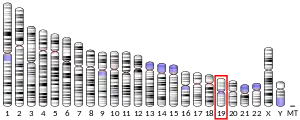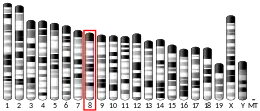Interleukin 27 receptor, alpha is a subunit of the interleukin-27 receptor. IL27RA is its human gene.[5]
Function
In mice, CD4+ helper T-cells differentiate into type 1 (Th1) cells, which are critical for cell-mediated immunity, predominantly under the influence of IL12. Also, IL4 influences their differentiation into type 2 (Th2) cells, which are critical for most antibody responses. Mice deficient in these cytokines, their receptors, or associated transcription factors have impaired, but are not absent of, Th1 or Th2 immune responses. This gene encodes a protein which is similar to the mouse T-cell cytokine receptor Tccr at the amino acid level, and is predicted to be a glycosylated transmembrane protein.[5]
Interactions
Interleukin 27 receptor, alpha subunit has been shown to interact with STAT1.[6]
References
- 1 2 3 ENSG00000288185 GRCh38: Ensembl release 89: ENSG00000104998, ENSG00000288185 - Ensembl, May 2017
- 1 2 3 GRCm38: Ensembl release 89: ENSMUSG00000005465 - Ensembl, May 2017
- ↑ "Human PubMed Reference:". National Center for Biotechnology Information, U.S. National Library of Medicine.
- ↑ "Mouse PubMed Reference:". National Center for Biotechnology Information, U.S. National Library of Medicine.
- 1 2 "Entrez Gene: IL27RA interleukin 27 receptor, alpha".
- ↑ Takeda A, Hamano S, Yamanaka A, Hanada T, Ishibashi T, Mak TW, Yoshimura A, Yoshida H (May 2003). "Cutting edge: role of IL-27/WSX-1 signaling for induction of T-bet through activation of STAT1 during initial Th1 commitment". J. Immunol. 170 (10): 4886–90. doi:10.4049/jimmunol.170.10.4886. PMID 12734330.
Further reading
- Sprecher CA, Grant FJ, Baumgartner JW, Presnell SR, Schrader SK, Yamagiwa T, Whitmore TE, O'Hara PJ, Foster DF (1998). "Cloning and characterization of a novel class I cytokine receptor". Biochem. Biophys. Res. Commun. 246 (1): 82–90. doi:10.1006/bbrc.1998.8576. PMID 9600072.
- Chen Q, Ghilardi N, Wang H, Baker T, Xie MH, Gurney A, Grewal IS, de Sauvage FJ (2000). "Development of Th1-type immune responses requires the type I cytokine receptor TCCR". Nature. 407 (6806): 916–20. Bibcode:2000Natur.407..916C. doi:10.1038/35038103. PMID 11057672. S2CID 205009928.
- Pflanz S, Timans JC, Cheung J, Rosales R, Kanzler H, Gilbert J, Hibbert L, Churakova T, Travis M, Vaisberg E, Blumenschein WM, Mattson JD, Wagner JL, To W, Zurawski S, McClanahan TK, Gorman DM, Bazan JF, de Waal Malefyt R, Rennick D, Kastelein RA (2002). "IL-27, a heterodimeric cytokine composed of EBI3 and p28 protein, induces proliferation of naive CD4(+) T cells". Immunity. 16 (6): 779–90. doi:10.1016/S1074-7613(02)00324-2. PMID 12121660.
- Takeda A, Hamano S, Yamanaka A, Hanada T, Ishibashi T, Mak TW, Yoshimura A, Yoshida H (2003). "Cutting edge: role of IL-27/WSX-1 signaling for induction of T-bet through activation of STAT1 during initial Th1 commitment". J. Immunol. 170 (10): 4886–90. doi:10.4049/jimmunol.170.10.4886. PMID 12734330.
- Pflanz S, Hibbert L, Mattson J, Rosales R, Vaisberg E, Bazan JF, Phillips JH, McClanahan TK, de Waal Malefyt R, Kastelein RA (2004). "WSX-1 and glycoprotein 130 constitute a signal-transducing receptor for IL-27". J. Immunol. 172 (4): 2225–31. doi:10.4049/jimmunol.172.4.2225. PMID 14764690.
- Rual JF, Venkatesan K, Hao T, Hirozane-Kishikawa T, Dricot A, Li N, Berriz GF, Gibbons FD, Dreze M, Ayivi-Guedehoussou N, Klitgord N, Simon C, Boxem M, Milstein S, Rosenberg J, Goldberg DS, Zhang LV, Wong SL, Franklin G, Li S, Albala JS, Lim J, Fraughton C, Llamosas E, Cevik S, Bex C, Lamesch P, Sikorski RS, Vandenhaute J, Zoghbi HY, Smolyar A, Bosak S, Sequerra R, Doucette-Stamm L, Cusick ME, Hill DE, Roth FP, Vidal M (2005). "Towards a proteome-scale map of the human protein-protein interaction network". Nature. 437 (7062): 1173–8. Bibcode:2005Natur.437.1173R. doi:10.1038/nature04209. PMID 16189514. S2CID 4427026.
- Pradhan A, Lambert QT, Reuther GW (2008). "Transformation of hematopoietic cells and activation of JAK2-V617F by IL-27R, a component of a heterodimeric type I cytokine receptor". Proc. Natl. Acad. Sci. U.S.A. 104 (47): 18502–7. doi:10.1073/pnas.0702388104. PMC 2141806. PMID 18003935.






